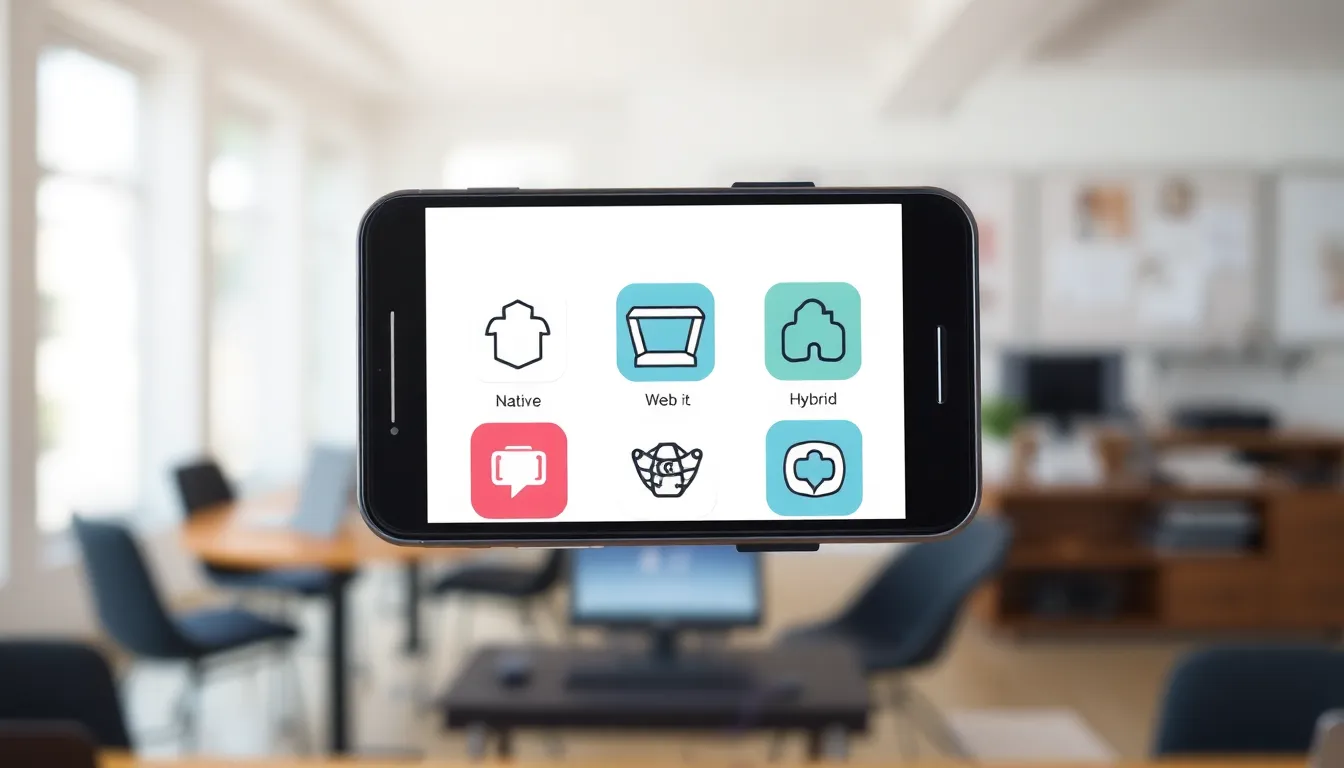In a world where smartphones are practically glued to our hands, it’s hard to imagine life without those little icons that promise to make everything easier. From managing schedules to ordering pizza with a few taps, smartphone apps have become the superheroes of everyday life—minus the capes and awkward spandex.
These digital wonders pack a punch, transforming mundane tasks into enjoyable experiences. Whether it’s tracking workouts or navigating a new city, apps are there to save the day, one notification at a time. So why settle for a boring routine when you can harness the power of technology to spice things up? Dive into the exciting universe of smartphone apps and discover how they can elevate your daily grind into something extraordinary.
Table of Contents
ToggleOverview of Smartphone Apps
Smartphone apps serve various purposes, significantly impacting daily routines. These applications facilitate numerous functions, from communication to entertainment. Users rely on apps for connecting with others, managing finances, and enhancing productivity. Mobile gaming, social media, and fitness tracking dominate popular categories in the app ecosystem.
App stores host millions of options, catering to diverse interests and needs. The Apple App Store reportedly features over 2 million apps, while Google Play offers approximately 3 million. Developers continually innovate, introducing new solutions that make life easier. Updates frequently enhance existing features, ensuring a seamless user experience.
Security remains a critical concern for users. Cybersecurity threats persist, prompting many developers to prioritize data protection and privacy. Regular app updates bolster security measures while increasing functionality. Users benefit from vigilance and research before downloading new apps.
User experience influences app popularity significantly. Designers focus on creating intuitive interfaces while optimizing performance. User reviews and star ratings guide potential downloads, encouraging developers to respond to feedback promptly. Engagement metrics reveal that well-designed apps retain users more effectively.
Smartphone apps are indispensable tools that shape contemporary life. The convenience and variety of options enhance user satisfaction, transforming how individuals interact with technology. Embracing these applications empowers users to explore new possibilities and enrich their daily activities.
Types of Smartphone Apps

Smartphone apps fall into three major categories: native apps, web apps, and hybrid apps. Each type offers unique features and functions that cater to diverse user needs.
Native Apps
Native apps are designed specifically for one operating system, such as iOS or Android. These applications utilize platform features, providing high performance and reliability. They offer seamless integration with device capabilities, like cameras and GPS. Developers create native apps using specific programming languages, such as Swift for iOS or Java for Android. Enhanced user experience comes from their responsive designs, making them popular among users. Frequent updates improve functionality, ensuring these apps remain competitive.
Web Apps
Web apps run on web browsers, making them accessible on various devices without installation. They rely on web technologies like HTML, CSS, and JavaScript. Users benefit from automatic updates, as changes occur on the server-side, eliminating the need for manual downloads. These applications are responsive and adjust to different screen sizes, enhancing usability. While they don’t offer full device integration, web apps provide essential functions for tasks like online shopping and social networking. Their universal compatibility contributes to their popularity among users.
Hybrid Apps
Hybrid apps combine elements from both native and web apps. These applications allow developers to write code once and deploy it across multiple platforms, saving time and resources. Built using web technologies, hybrid apps utilize a native container for improved device access. Users enjoy the flexibility of installing the app through app stores while benefiting from web-based features. Performance varies depending on the implementation, but hybrid apps offer a balanced solution for many users. Regular updates help refine functionalities and improve overall experience.
Popular Smartphone Apps
Smartphone apps cater to various needs, enhancing everyday tasks and experiences. They enable users to stay connected, boost productivity, and enjoy entertainment, all at their fingertips.
Social Media Apps
Social media apps like Facebook and Instagram connect users across the globe. These platforms facilitate real-time communication through messaging, video calls, and posts. They allow individuals to share experiences instantly, promoting engagement and interaction. Many users rely on these apps for news, updates, and maintaining relationships with friends and family. Effective algorithms personalize user feeds, showcasing relevant content and advertisements based on interactions.
Productivity Apps
Productivity apps such as Trello and Slack streamline workflow and collaboration. These tools help manage tasks, schedules, and team communication efficiently. Users benefit from features like calendar integration, project trackers, and file sharing. Real-time updates ensure that everyone stays informed about project statuses and deadlines. Many professionals utilize these apps to enhance time management and organization, resulting in improved overall productivity.
Entertainment Apps
Entertainment apps, including Netflix and Spotify, provide endless options for leisure and enjoyment. Users can access movies, TV shows, and music on-demand, catering to diverse tastes. High-quality streaming capabilities enhance viewing experiences, while personalized playlists keep users engaged. These apps often include offline functionality, allowing users to download content for later. Engaging algorithms recommend new shows and music based on listening habits, enriching the entertainment experience.
The Impact of Smartphone Apps
Smartphone apps significantly shape how individuals and businesses operate within today’s digital landscape. They enhance convenience and efficiency while transforming everyday interactions.
On Daily Life
Smartphone apps streamline tasks, enabling users to manage various aspects of daily life with ease. Scheduling apps help organize appointments, ensuring nothing gets forgotten. Food delivery apps simplify dining choices, allowing users to enjoy meals from various restaurants without leaving home. Communication apps enhance connections, enabling instant messaging and video calls with family and friends. Overall, these tools create a more efficient routine, enriching experiences and transforming mundane activities into enjoyable moments.
On Businesses
Smartphone apps revolutionize business operations, offering tools that improve efficiency and customer engagement. Marketing apps enable targeted advertising, maximizing outreach and increasing sales potential. Inventory management apps provide real-time tracking, ensuring businesses maintain optimal stock levels. Additionally, customer relationship management (CRM) apps enhance interactions, helping businesses understand and meet customer needs. Embracing these technologies allows businesses to not only streamline processes but also to foster stronger relationships with customers, ultimately driving success in a competitive marketplace.
Future Trends in Smartphone Apps
Emerging trends in smartphone apps shape the future landscape of mobile technology. Artificial intelligence integration offers personalized experiences, where apps adapt to user behavior and preferences. The rise of augmented reality creates engaging environments, enhancing everything from gaming to retail experiences.
Increased focus on user privacy ensures that developers prioritize data protection, establishing trust with users. Notifications for app updates become more sophisticated, with predictive alerts that enhance user interaction. Voice-activated functionalities grow in popularity, making hands-free operations a standard feature in many apps.
Additionally, the adoption of 5G technology significantly influences app performance. This advancement enhances real-time data processing, resulting in quicker loading times and improved app capabilities. Furthermore, sustainability trends prompt developers to create eco-friendly apps, focusing on energy efficiency and carbon footprint reduction.
Social media apps will continue evolving, introducing features that promote authentic connections over superficial engagement. The demand for mental health and wellness apps grows, reflecting an increasing societal focus on well-being. Fitness apps now integrate wearable device data, offering users a comprehensive view of their health metrics.
Mobile commerce apps expand their capabilities, streamlining payment processes and strengthening customer loyalty through personalized offerings. Gamification features infuse various app categories, making mundane tasks more engaging and enjoyable. As these trends develop, user experience remains central, guiding continued innovation in the smartphone app ecosystem.
Smartphone apps have become essential companions in everyday life. They not only simplify tasks but also enrich experiences across various domains. As technology continues to evolve, these applications adapt to meet users’ needs, integrating features like artificial intelligence and augmented reality.
The diverse range of apps available ensures that everyone can find tools tailored to their preferences, whether for productivity, entertainment, or communication. As developers focus on enhancing user experience and security, the future looks promising for smartphone applications. Embracing these innovations will empower users to unlock new possibilities and improve their daily routines.






